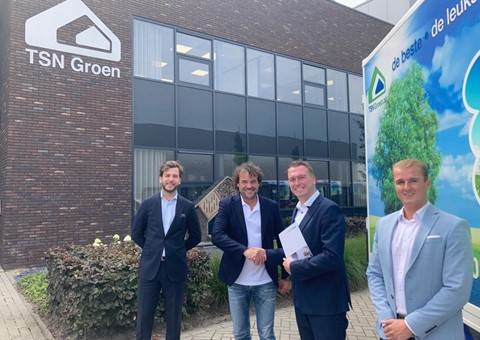
An ever increasing number of logistics companies are switching to zero-emission vehicles, in part due to the introduction of zero-emission zones in the Netherlands, starting in 2025. This will mean that transport companies will no longer be permitted to enter many Dutch town and city centres if they are using outdated petrol or diesel vehicles. Starting in 2030, only electric or hydrogen-powered vehicles will be permitted access to town and city centres. Mutual interest on the part of Scholt Energy and TSN Groen in the combination of energy supply, solar panels and battery storage brought the parties together.

Revenue through HBEs
The two parties will enter into a partnership that will maximise the coordination of solar panel generation and electric vehicle charging. Scholt Energy will be able to relieve the strain on TSN Groen with its complete energy portfolio, from energy supply and use of sustainable solutions to advising on relevant developments within the energy transition.
TSN Groen has 56 electric delivery vans and hopes to grow this number to 100 by 2023/2024. On this basis, Scholt Energy expects a charge quantity of no less than 2,000,000 kWh across TSN Groen sites by 2024. A number of TSN Groen sites are already fitted with solar systems, including a 1 MWp installation on the roof at the Houten site. By using an energy management system to demonstrate that the electric vans are charged using these solar systems, TSN Groen will be able to receive more HBEs (green certificates for electric charging). ‘Smart charging’ will also be used, generating even more HBEs from the electricity generated by the solar panels. This will help to generate more revenue. Scholt Energy will control the entire process and trade the HBEs. TSN Groen will receive reimbursement for this, generating yet more revenue. Optimising HBE revenue through smart charging makes this business case particularly attractive to transport companies.
The benefits for TSN Groen:
- Improvement of the business case for fleet electrification. Acceleration of the transition to ‘electric’.
- Improvement of own consumption of solar energy. This can remove additional load from the grid, as less/no feed-in is required.
- Little to no additional work, as Scholt Energy carries out all accompanying processes.
Sustainable ambitions
For TSN Groen, the focus is on making the business and the transport industry more sustainable. In the future, Scholt Energy and TSN Groen are hoping to deploy Asset Management, battery control and an energy management system at other sites in the Netherlands and Belgium.
Also interested in HBEs?
Please contact our Energy Transition Specialists.


